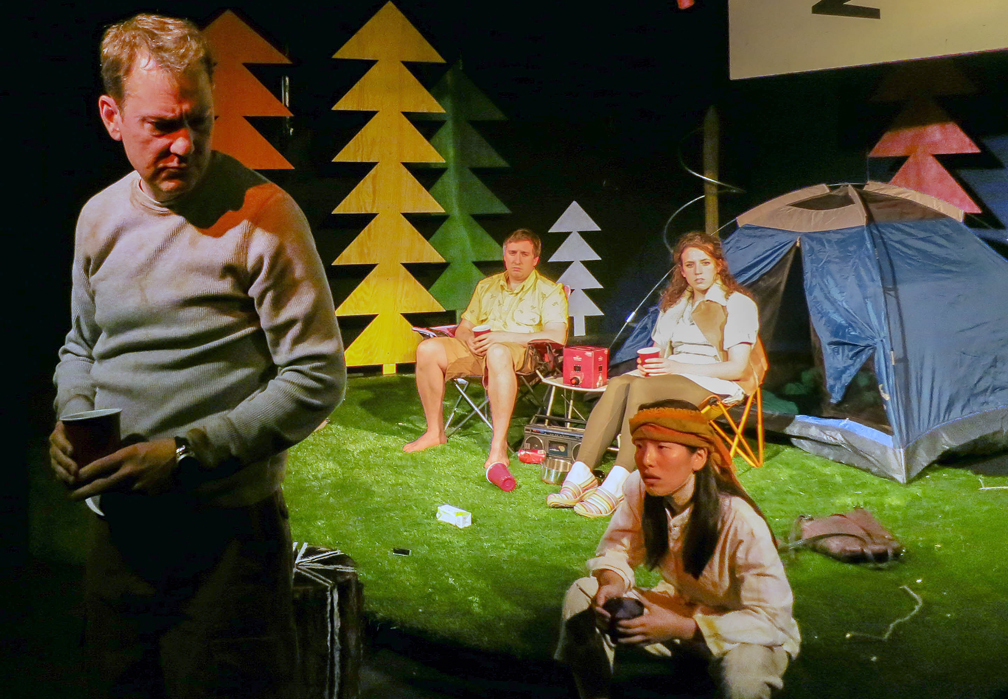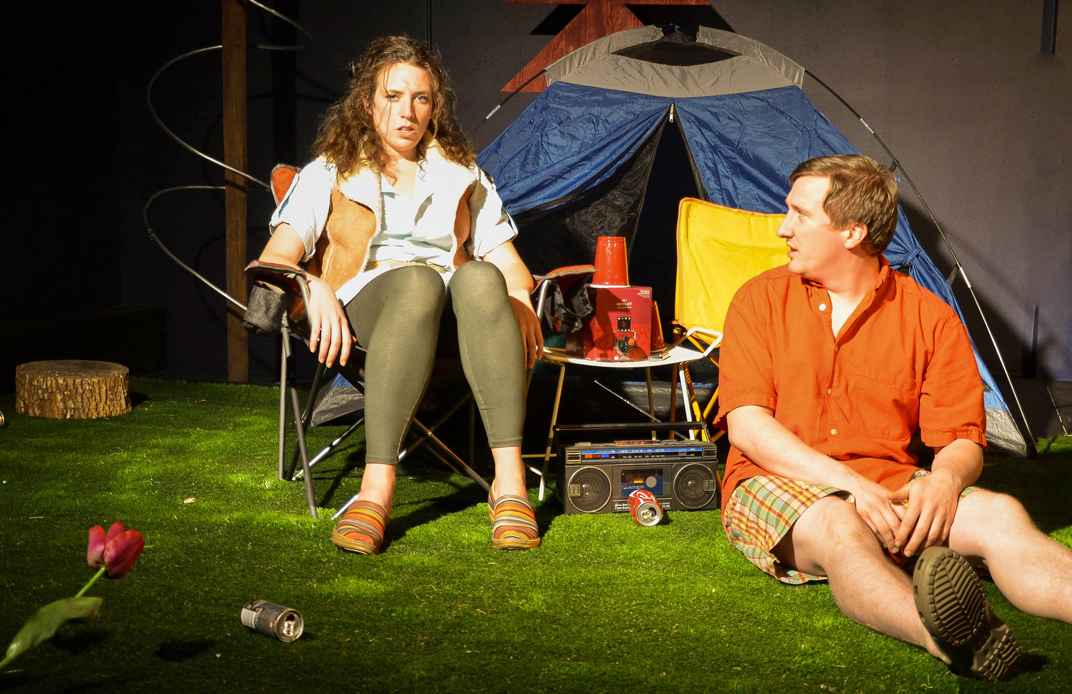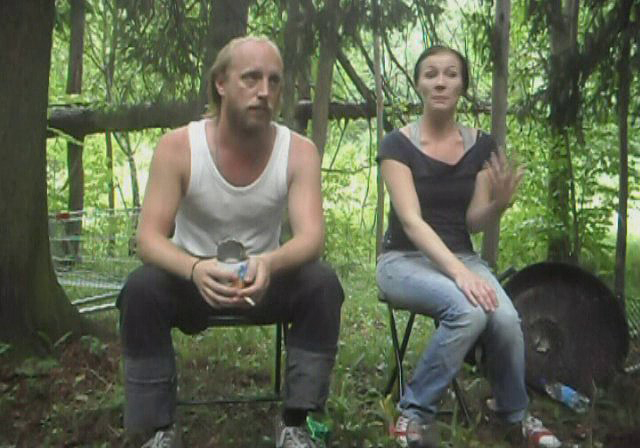'They Died Where They Lied'
Sofia Fredén's They Died Where They Lied (Dom stod och dog, 2001) is currently playing in Chicago.
-
 Piotr, Erik, Anna, Nuket in the Akvavit Theatre production presently running at Den Theatre in Chicago.
Piotr, Erik, Anna, Nuket in the Akvavit Theatre production presently running at Den Theatre in Chicago. -
-
The U.S. premiere of internationally acclaimed Swedish playwright Sofia Fredén’s They Died Where They Lied (Dom stod och dog, 2001) opened Thursday, 31 October, 2013 in Chicago and runs until 1 December, 2013 at the award-winning Den Theatre (1331 N. Milwaukee Ave., Chicago, IL, 60622). This latest production by Nordic-focused Akvavit Theatre, co-directed by Matthew Isler and Mark Litwicki and produced by Bergen Anderson, stages a bitter, darkly comic portrait of a troubled couple’s attempt at respite on a weekend camping getaway on the edge of one of Sweden’s urban areas. As the English title translation of Chad Eric Bergman (adapted from Edward Buffalo Bromberg) suggests, however, this is a story about a couple that doesn’t get very far.
-
 Anna (Mallory Nees) and Erik (Brian Hoolahan) at the camp site.
Anna (Mallory Nees) and Erik (Brian Hoolahan) at the camp site. -
-
Indeed, the temporal, spatial and emotional registers of this presentation – enchanted by the possibilities of escape, visibly tethered by the contradictions of the middle-class everyday – leave the audience, at its end, with the implausible gift of “failed” narrative experience – the laying bare of the framework in which so many emotional investments and wish images might find their fulfillment, but are inexplicably, irretrievably lost along the way. In a recording played after the end of the dialogue, in lieu of a properly diegetic resolution, a woman’s voice leaves the audience with the consolatory, pithy guidance that the future of Erik and Anna will only matter for those who live to see it: “the others – they won’t need to.”
-
 To get a taste (if you understand Swedish), there’s a four-minute exerpt available on vimeo with the actors Anna Kopparv and Leif Wedin recorded somewhere in a Swedish forest. A production by Kopparv-Wedin, 2011: <a href="http://vimeo.com/68323051" target="_blank">“Dom stod och dog”</a>
To get a taste (if you understand Swedish), there’s a four-minute exerpt available on vimeo with the actors Anna Kopparv and Leif Wedin recorded somewhere in a Swedish forest. A production by Kopparv-Wedin, 2011: <a href="http://vimeo.com/68323051" target="_blank">“Dom stod och dog”</a> -
The shared illusory space of this couple, struggling to engage in meaningful conversation and take advantage of the newfound time Erik has following a job loss, is forced upon the audience with the uncomfortable silence of the opening minutes of the script. And just as much as the wine must get to work before Erik and Anna can begin to talk, so too, it takes the arrival of two seasonal workers who wander onto the campsite for us to realize the arbitrary confinements of this little world. For Erik and Anna not only return, in circles, to the same questions and arguments, but barely move anywhere at all – not far from home, from the campsite, and literally, not leaving the stage. In ironic contrast to their financial situations, the Thai woman (Nuket) who has moved to Sweden for berry picking and the Polish man (Piotr) who came to collect mushrooms are the ones who seem able to come and go as they please, and do – making themselves guests on the couple’s campsite, drinking their wine, water and soup – after which Erik and Anna realize their fear of dying of thirst (Anna didn’t remember they had any water until the Thai woman asked for some). If Erik and Anna seem uncertain and unduly restrained, the seasonal workers present a fierce, goal-driven independence marked by a clear sense of belonging and returning to other, distant friends and places, even as much as this mobility is still directed by the transient nature of their work.
-
Brian Hoolahan plays a heartful and focused role as Erik, directing the emotive force of much of the script, while Mallory Nees brings its wit to life with effortless, natural indulgences. Pearl Paramadilok offers a strong, spirited characterization as Nuket and Scott Anderson delivers a delightfully austere and solid performance as the Polish man. A fifth and equally evocative performance is given by the plastic playroom qualities of the set itself, designed by Chad Eric Bergman, which underscore the somewhat sentimental and underdeveloped, less than fully mature world the couple lives in. Everything from the Legoland colors – a palette of primary reds, blues and yellows, with bright orange and AstroTurf green thrown in – to the materiality of the props (plywood, SOLO cups, boxed wine; a collection Erik himself mourns in his critique of cheap, environmentally destructive goods) adds to the quick-setup, IKEA-chic sensibility so intrinsic to global capital growth.
-
The fragmentary, partly non-diegetic nature of the sound design deserves special mention, and is what finally seems to provide access into the shape of Fredén’s script insofar as it refracts contemporary Sweden. A recording of a conversation between two men on Swedish public radio locates the production, via the presence of an old radio/cassette player sitting between the two lawn chairs, in the context of critical commentary on growing poverty and economic catastrophe. Intermittent, migraine-size blasts of a passing train further identify the campsite’s proximity to prominent lines of urban access, while a brief mix of early 70’s pop floats over from a party nearby in the forest. Voiceovers which provide occasional English translations as Nuket and Piotr speak (they switch, apparently, between Thai, Polish, English and Swedish) seem to accentuate psychic discontinuities: gaps and ellipses that puncture rational spaces of action. These audio fragments, strewn about like the litter circling the campsite, or floating like water lanterns around this myopic island, simultaneously shield Erik and Anna from the wider world and illuminate their self-absorbed isolation within it.
-
A superbly biting comedy, They Died Where They Lied dares us to laugh amidst the tragic absurdity of fearing the loss of that which may have already disappeared; and of the inability to recognize or locate oneself in relation to the dreams and partners with whom our love strives to be made adequate. And, perhaps, to leave lighter with the hope that any unwillingness or anxiety we might feel at our inability to fully untangle or empathize with the fog of issues surrounding Erik and Anna measures some critical distance we still have from them.
-
I highly recommend catching this captivating show during its short run – and watching out for Akvavit’s ongoing original translations and productions of Nordic drama – especially an upcoming work by Icelandic dramatist Bjarni Jónsson in 2014. They Died Where They Lied runs for 75 minutes without intermission, Fridays and Saturdays at 7:30pm and Sundays at 3pm until 1 December. Additional performances will be held Monday 11 November and Thursday 21 November, both at 7:30pm. For tickets and company information, please see http://www.akvavittheatre.org.
-
Shannon Foskett
-
“Dom stod och dog” [They Died Where They Lied]
To get a taste (if you understand Swedish), there’s a four-minute exerpt available on vimeo with the actors Anna Kopparv and Leif Wedin recorded somewhere in a Swedish forest. A production by Kopparv-Wedin, 2011: http://vimeo.com/68323051 -
-
-
